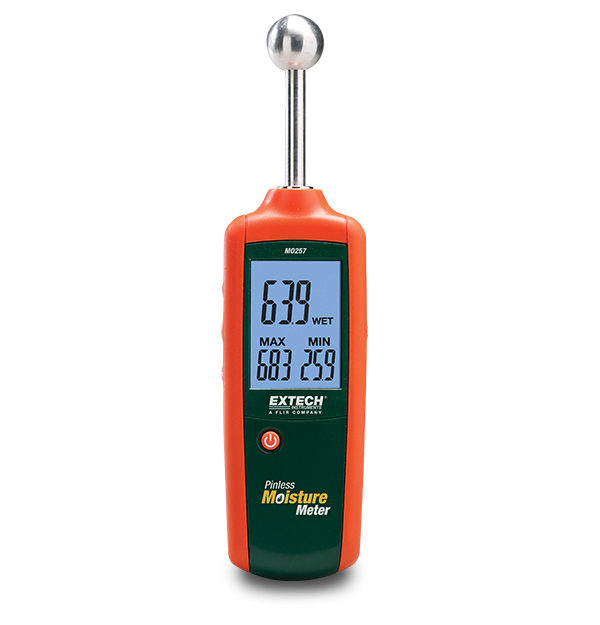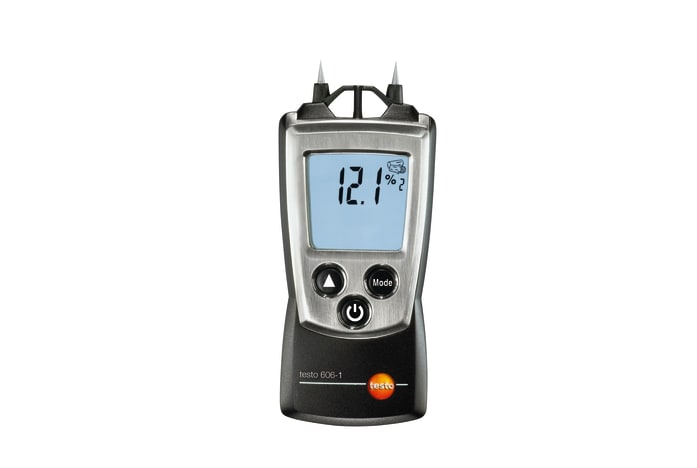Why Every Property Owner Demands a Moisture Meter: Key Benefits and Features
Why Every Property Owner Demands a Moisture Meter: Key Benefits and Features
Blog Article
The Ultimate Guide to Wetness Meters: A Comprehensive Summary and Just How They Can Save You Money
Dampness meters serve as vital tools in detecting and checking moisture web content in products, helping in stopping pricey damages and making certain the high quality of items. Understanding the subtleties of different types of wetness meters, their applications, and the possible cost-saving benefits they provide can be a game-changer for professionals and companies alike.
Kinds Of Dampness Meters
One usual kind is the pin-type dampness meter, which gauges the electric resistance in between two pins inserted into a material. Pinless wetness meters, on the other hand, use electromagnetic sensing unit plates to check a bigger area without causing damage to the product's surface area.

Infrared moisture meters determine the thermal homes of a product to determine its wetness web content non-invasively, making them helpful for applications where pin or pinless meters might not be ideal. Comprehending the various kinds of wetness meters offered can aid industries pick the most appropriate tool for their certain moisture measurement demands.

Advantages of Utilizing Moisture Meters
Wetness meters use important benefits in accurately monitoring and evaluating dampness degrees in diverse products and atmospheres. One of the key benefits of using dampness meters is the avoidance of possible damages created by excess dampness.
Additionally, making use of dampness meters can lead to boosted power performance. In farming settings, dampness meters play an important function in optimizing plant returns by enabling farmers to monitor soil dampness degrees and make notified irrigation choices.
Exactly How to Pick the Right Wetness Meter
When selecting a moisture meter, it's important to guarantee that the meter is suitable for the details product you will certainly be testing. Different materials have varying electrical residential properties that can influence dampness readings, so choosing a meter designed for your material is crucial for accurate outcomes. By very carefully reviewing these factors, you can pick a dampness meter that satisfies your needs and provides exact dampness measurements for your projects.
Correct Strategies for Dampness Meter Usage

Price Savings With Dampness Meter Applications
Just how can the strategic use of dampness meters lead to significant cost savings across various industries? Dampness meters play an important function in expense financial savings by preventing prospective damages and making sure top quality control in various markets. In the farming market, wetness meters aid in figuring out the ideal time for gathering crops, avoiding over-drying or excess moisture that can influence the final item's top quality. This specific tracking helps farmers avoid unneeded losses and optimize their return.
In a similar way, in building and construction, dampness meters assist protect against costly problems by detecting dampness degrees in structure materials, such as timber or concrete, which can cause architectural concerns otherwise dealt with quickly. By recognizing problem areas early on, specialists can take corrective procedures to avoid substantial fixings or replacements, eventually conserving time and cash.
Additionally, in the food processing market, site link dampness meters are important for keeping an eye on item quality and guaranteeing conformity with safety and security regulations. By precisely determining dampness content in food, producers can stop perishing, maintain freshness, and decrease waste, leading to substantial cost savings. Generally, the critical application of moisture meters is an important financial investment that can cause significant price reductions and enhanced effectiveness throughout numerous industries.
Final Thought
In final thought, wetness meters are valuable tools for measuring and identifying dampness degrees in various materials. By utilizing the appropriate moisture meter and adhering to appropriate strategies, customers can properly stop expensive damages created by excess moisture.
Moisture meters serve as important tools in spotting and monitoring moisture content in products, assisting in protecting against pricey damages and making sure the quality of items. Infrared wetness meters gauge the thermal properties of a product to establish its moisture content non-invasively, making them valuable for applications where pin or pinless meters might not be appropriate.Moisture meters offer vital advantages in properly keeping track of and assessing wetness degrees in varied materials and environments. In agricultural settings, wetness meters play a crucial role in enhancing crop yields by allowing farmers to view publisher site keep an eye on dirt dampness degrees and make educated watering choices.In conclusion, moisture meters are important tools for gauging and detecting moisture levels in various materials.
Report this page